Russell H. Dilday, whose tenure as president of Southwestern Baptist Theological Seminary in Fort Worth, Texas, saw the school’s endowment more than double while leading the seminary to it its greatest period of growth but who was fired in 1994 by fundamentalists controlling the board of trustees, died June 21. He was 92.
Dilday had been in failing health the past two years, according to his daughter, Nancy Dilday Duck. He was living in Dallas at Ventana by Buckner senior living community.
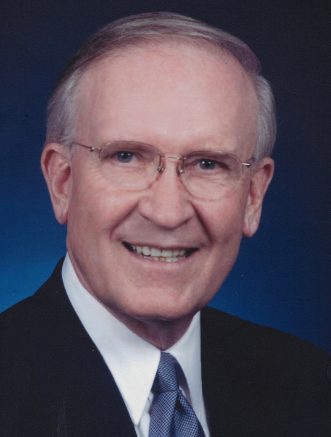
Russell Dilday
“Daddy never lost his wonderful sense of humor and his heart for ministry,” his family said in a statement. “Everyone around him loved and admired him. We are sad to lose him, but we are grateful for his amazing life and all he did for the kingdom of God. We have lost a wonderful father and Baptists have lost a great leader.”
Dilday served as president of Southwestern Seminary from 1978 to 1994. During his tenure, the school became the largest theological seminary in the world and was responsible for training more than half of all Southern Baptist missionaries at the time. His time as president was marked by ongoing battles with a fundamentalist board during the height of Southern Baptists’ political struggles for control of the nation’s largest non-Catholic denomination.
Toby Druin, former editor of the Baptist Standard, remembered Dilday’s grace in the face of difficult times for Southwestern and Southern Baptists.
“Russell Dilday was the epitome of a Christian leader and statesman and a staunch defender of Baptist principles. He was outspoken in his defense of the authority of the Bible,” Druin said. “He was president of Southwestern Seminary during its greatest years.
“I will always remember him for his character and integrity and his friendship toward the Baptist Standard.”
After his firing March 9, 1994, Dilday served as president of the Baptist General Convention of Texas and in leadership roles at two other BGCT-affiliated schools. He was a retired distinguished professor of homiletics at Baylor University’s George W. Truett Theological Seminary and served as special assistant to the president of Baylor University. In 2002, he served as interim president of Howard Payne University in Brownwood, Texas, and he was instrumental in founding B.H. Carroll Theological Institute, serving as its first chancellor.
In addition to his service in institutional and denominational life, Dilday served as the founding pastor of Tallowood Baptist Church in Houston and as pastor of Second Ponce de Leon Baptist Church in Atlanta, along with churches in Antelope, Texas, and Clifton, Texas. He also served several churches as interim pastor.
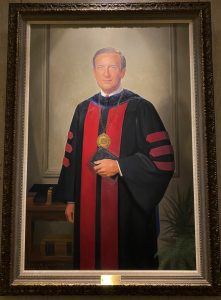
Portrait of Russell Dilday hanging in the Rotunda at Southwestern Seminary.
Throughout his career, Dilday was a prolific author, writing numerous articles and books, including his highly regarded commentary on 1 and 2 Kings for The Preacher’s Commentary series. In addition, he contributed to numerous books and anthologies.
Known as one of the Southern Baptist Convention’s leading statesmen during his career, Dilday was only the second president of an SBC seminary to preach the convention’s annual sermon in 1984, following in the footsteps of E.Y Mullins, who was the subject of Dilday’s doctoral dissertation.
It was that sermon in Kansas City, Mo., that put him in the crosshairs of fundamentalist leaders of the convention. Riffing on the title “Higher Ground,” Dilday called on Southern Baptists to put aside denominational politics and power struggles and aspire to a higher standard.
“Stay on the heights, Southern Baptists,” he urged messengers. “You’re doing a great work. Stay close to the Lord and to the task he has called you to perform. Be faithful to your historic heritage. Don’t dabble in controversies or exhaust your energies arm-wrestling for denominational control. Stay on the higher ground of spiritual persuasion, autonomous individualism, (and) the Christ-like humility where you belong.”
In 2007, Dilday released a book titled Higher Ground: A Call for Christian Civility, in which he called for Baptists “to move beyond the lowlands of caustic controversy to the higher ground of Christian civility.”
His firing from Southwestern Seminary sent shockwaves through the SBC. A photo of the locks on his office being changed circulated through Baptist state papers and brought a torrent of criticism to trustees. Media outlets from across the country covered the story.
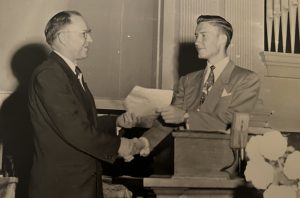
Russell Dilday ordination
Dilday later recalled a rally of students outside his home the day after the firing: “Betty and I led them in singing ‘Open our eyes, Lord, we want to see you.’ I will always remember that moment. It was a moment that said to them and to us, ‘God is at work in all things for good. God can bring good out of evil. God’s way is to leave the past behind and focus on Jesus.”
“The grace with which Dr. Dilday handled his firing amazes me to this day,” said Alan Lefever, Baptist historian and director of the Texas Baptist Historical Collection. “There was no desire for revenge, no bitterness at being unjustly dismissed, only a conviction to follow God’s call.
“I believe history will remember Russell Dilday in the same way we recall George Truett or R.C. Buckner. He was a man of grace, charity and conviction. We should all seek to emulate his example,” Lefever said.
Dilday’s 2004 book Columns: Glimpses of a Seminary Under Assault, gives a detailed account of events leading up to his dismissal.
“My disagreement (with SBC fundamentalists) was always aimed at the fundamentalist spirit, the secular political methodology of the takeover party and their disregard for authentic Baptist principles,” he wrote.
Todd Still, dean of Truett Seminary where Dilday served after his firing at Southwestern, called him “an unusually gifted preacher, administrator and leader. Dr. Dilday helped to light the way for innumerable students, myself included, as well as for congregations, institutions and a denomination for years on end. I am, and we are, diminished by his death even as we were blessed by his life. He will always be the standard of a Christian gentleman and scholar.”
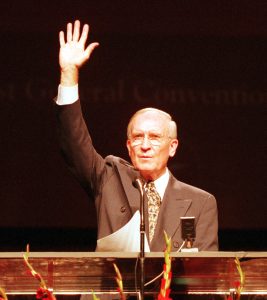
Four years after his ouster at Southwestern Seminary, Russell Dilday was elected president of the Baptist General Convention of Texas. (Photo by Joe Raedle/Getty Images)
A native Texan, Dilday grew up in a Texas Baptist minister’s home. His father, Hooper Dilday, served a number of Texas churches and was on the staff of the BGCT for 20 years in Sunday school, discipleship training and church services. His father also was longtime minister of education at First Baptist Church in Wichita Falls, Texas. His mother, Opal Spillers Dilday, was born in Memphis, Texas, and was a children’s educational specialist in Baptist churches in Amarillo, Port Arthur, Port Neches, Wichita Falls and Dallas.
Russell Hooper Dilday was born Sept. 30, 1930, in Amarillo. He was the older of three brothers and a sister born to Hooper and Opal Dilday. He earned a bachelor’s degree from Baylor University, where he met his wife, Betty, who died in 2018. The couple first met in a Bible class at Baylor University and were married 66 years.
He earned a master of divinity and doctor of philosophy degrees from Southwestern Seminary.
Russell Dilday was preceded in death by his wife, Betty; a younger brother, Don Dilday; and his son, Robert Dilday, former managing editor of Baptist News Global. Survivors include his two daughters, Nancy Duck and husband Nolan, and Ellen Garrett and husband Shannon, along with six grandchildren, six great-grandchildren, and numerous nieces and nephews. He also is survived by his sister Ann Young and her husband Mack, along with a brother, Jim Dilday.
The family has requested memorials be made to the Russell H. Dilday Chair in Baptist Life and Leadership at Baylor University’s George W. Truett Theological Seminary by contacting Jon Sisk at [email protected] or calling (254) 715-6124. A memorial service is planned for Saturday, July 8, at 10 a.m. at Park Cities Baptist Church in Dallas.
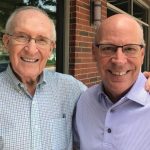
Russell Dilday and Scott Collins in 2018.
Scott Collins served as director of public relations at Southwestern Seminary at the time of Russell Dilday’s firing there and has been a lifelong friend of Dilday’s ever since. Russ Dilday is a nephew to Russell Dilday.
